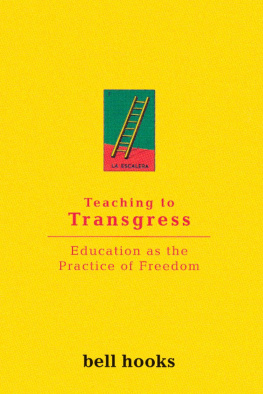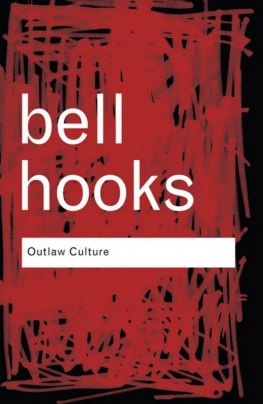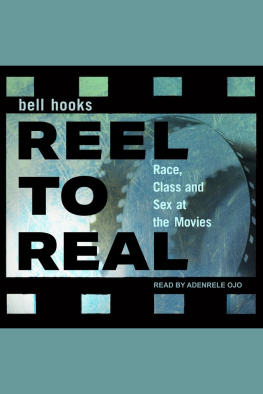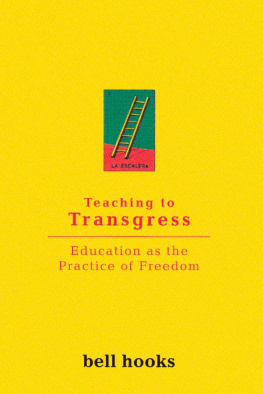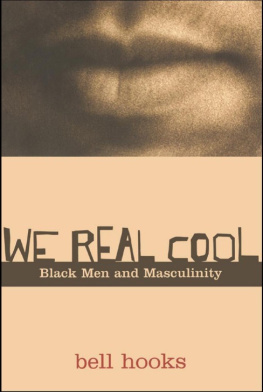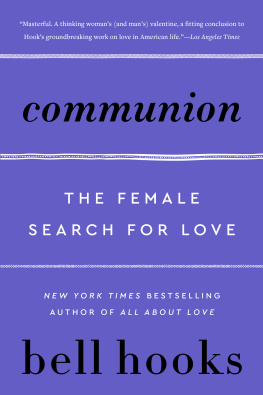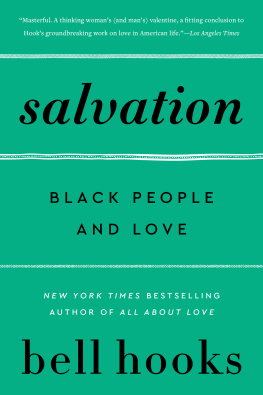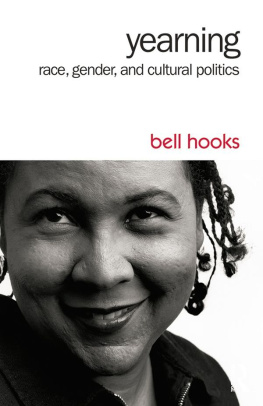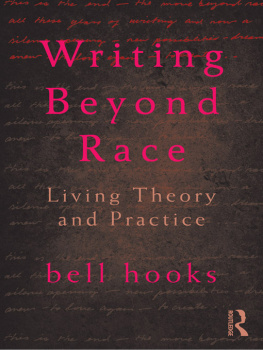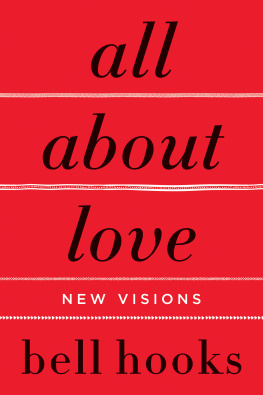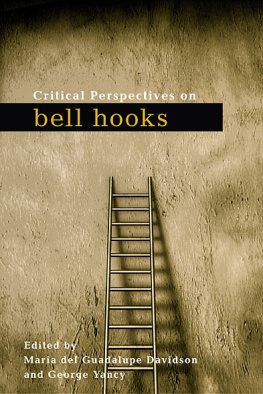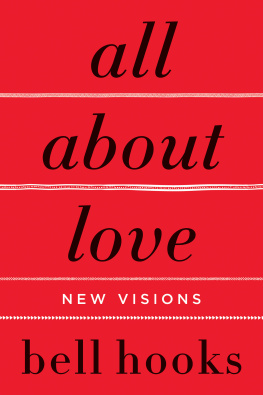Also by bell hooks
Aint I a Woman: Black Women and Feminism
Feminist Theory: From Margin to Center
Talking Back: Thinking Feminist, Thinking Black
Yearning: Race, Gender, and Cultural Politics
Breaking Bread: Insurgent Black Intellectual Life
Black Looks: Race and Representation
Sisters of the Yam: Black Women and Self-Recovery
Teaching to Transgress: Education as the Practice of Freedom
Outlaw Culture: Resisting Representations
Art on My Mind: Visual Politics
Killing Rage: Ending Racism
Reel to Real: Race, Sex, and Class at the Movies
Bone Black: Memories of Girlhood, Vol. 1
Wounds of Passion: A Writing Life
Remembered Rapture: The Writer at Work
Happy to Be Nappy
All about Love: New Visions
Feminist Theory: From Margin to Center
Where We Stand: Class Matters
Salvation: Black People and Love
Communion: The Female Search for Love
Rock My Soul: Black People and Self-Esteem

1230 Avenue of the Americas
New York, NY 10020
Copyright 2004 by Gloria Watkins
All rights reserved, including the right to reproduce this book or portions thereof in any form whatsoever. For information address Atria Books, 1230 Avenue of the Americas, New York, NY 10020
ISBN-10: 0-7434-8033-3
ISBN-13: 978-0-7434-8033-8
First Atria Books hardcover edition January 2004
ATRIA BOOKS is a trademark of Simon & Schuster, Inc.
Visit us on the World Wide Web:
http://www.SimonSays.com
Alchemically transforming lead into true gold, men are given the opportunity to burn, to be touched by an inner fire, to live a life of substance, to be changed utterly.
This book is dedicated to the memory of my grandfather, Gus Oldhamburning, a heart on fire, whose love, stronger than death, illuminates.
In our rapidly changing society we can count on only two things that will never change. What will never change is the will to change and the fear of change. It is the will to change that motivates us to seek help. It is the fear of change that motivates us to resist the very help we seek.
Harriet Lerner, The Dance of Intimacy
Contents
W hen Phyllis Cheslers book About Men was first published more than ten years ago, I was excited. At last, I thought then, a feminist thinker will explain this mysterymen. Back then I had never shared with anyone the feelings I had about men. I had not been able to confess that not only did I not understand men, I feared them. Chesler, with her usual take no prisoners daring, I was certain, would not simply name this fear, explain it, she would do much more: she would make men real to me. Men would become people I could talk to, work with, love. Her book was disappointing. Filled with quotes from numerous sources, newspaper clippings of male violence, it offered bits and pieces of information; there was little or no explanation, no interpretation. From that time on I began to think that women were afraid to speak openly about men, afraid to explore deeply our connections to themwhat we have witnessed as daughters, sisters, grandmothers, mothers, aunts, lovers, occasional sex objectsand afraid even to acknowledge our ignorance, how much we really do not know about men. All that we do not know intensifies our sense of fear and threat. And certainly to know men only in relation to male violence, to the violence inflicted upon women and children, is a partial, inadequate knowing.
Nowadays I am amazed that women who advocate feminist politics have had so little to say about men and masculinity. Within the early writings of radical feminism, anger, rage, and even hatred of men was voiced, yet there was no meaningful attempt to offer ways to resolve these feelings, to imagine a culture of reconciliation where women and men might meet and find common ground. Militant feminism gave women permission to unleash their rage and hatred at men but it did not allow us to talk about what it meant to love men in patriarchal culture, to know how we could express that love without fear of exploitation and oppression.
Before her death Barbara Deming was among those rare outspoken feminist thinkers who wanted to create a space for women to talk openly about our feelings about men. Articulating her concern that the wellspring of female fury at men was making it impossible for women to express any other feelings than their sense that men are hopeless, she stated: It scares me that more and more women are coming to feel this way, to feel that men as an entire gender are hopeless. Deming did not feel that men were incapable of change, of moving away from male domination, but she did feel that it was necessary for women to speak the truth about how we think about men: I believe that the only way we can get where we have to go is by never refusing to face the truth of our feelings as they rise up in useven when we wish it were not the truth. So we have to admit to the truth that we sometimes wish our own fathers, sons, brothers, lovers were not there. But, this truth exists alongside another truth: the truth that this wish causes us anguish. While some women active in the feminist movement felt anguished about our collective inability to convert masses of men to feminist thinking, many women simply felt that feminism gave them permission to be indifferent to men, to turn away from male needs.
When contemporary feminism was at its most intense, many women insisted that they were weary of giving energy to men, that they wanted to place women at the center of all feminist discussions. Feminist thinkers, like myself, who wanted to include men in the discussion were usually labeled male-identified and dismissed. We were sleeping with the enemy. We were the feminists who could not be trusted because we cared about the fate of men. We were the feminists who did not believe in female superiority any more than we believed in male superiority. As the feminist movement progressed, the fact became evident that sexism and sexist exploitation and oppression would not change unless men were also deeply engaged in feminist resistance, yet most women were still expressing no genuine interest in highlighting discussions of maleness.
Acknowledging that there needed to be more feminist focus on men did not lead to the production of a body of writing by women about men. The lack of such writing intensifies my sense that women cannot fully talk about men because we have been so well socialized in patriarchal culture to be silent on the subject of men. But more than silenced, we have been socialized to be the keepers of grave and serious secretsespecially those that could reveal the everyday strategies of male domination, how male power is enacted and maintained in our private lives. Indeed, even the radical feminist labeling of all men as oppressors and all women as victims was a way to deflect attention away from the reality of men and our ignorance about them. To simply label them as oppressors and dismiss them meant we never had to give voice to the gaps in our understanding or to talk about maleness in complex ways. We did not have to talk about the ways our fear of men distorted our perspectives and blocked our understanding. Hating men was just another way to not take men and masculinity seriously. It was simply easier for feminist women to talk about challenging and changing patriarchy than it was for us to talk about menwhat we knew and did not know, about the ways we wanted men to change. Better to just express our desire to have men disappear, to see them dead and gone.


